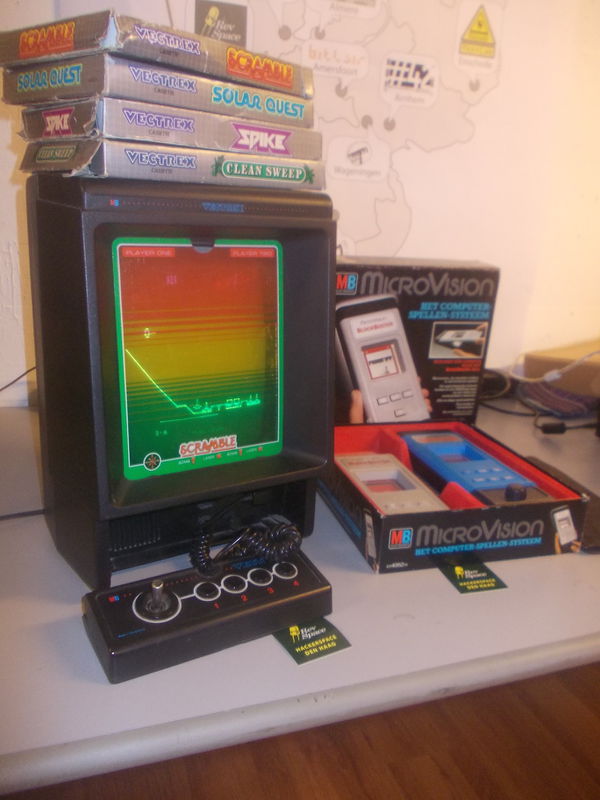User:Vectrex: Difference between revisions
No edit summary |
No edit summary |
||
| Line 13: | Line 13: | ||
* Cartridge : 32 kB | * Cartridge : 32 kB | ||
* MOS 6522 Versatile Interface Adapter (VIA) | * MOS 6522 Versatile Interface Adapter (VIA) | ||
==Picture== | |||
* 5" Monochrome CRT | |||
* 8-bit ADC with current output feeds two resettable integrators controlling x and Y of beam, for drawing vectors | * 8-bit ADC with current output feeds two resettable integrators controlling x and Y of beam, for drawing vectors | ||
* Z control for dimming CRT beam | * Z control for dimming CRT beam | ||
| Line 23: | Line 26: | ||
One or two analog controllers, each using an x-y analog (potentiometer) joystick, and four action buttons. <br> | One or two analog controllers, each using an x-y analog (potentiometer) joystick, and four action buttons. <br> | ||
Connected to main system using a DB-9 connector on a curled cable. | Connected to main system using a DB-9 connector on a curled cable. | ||
==Power== | |||
Mains powered. | |||
=Software= | =Software= | ||
| Line 35: | Line 41: | ||
* Scramble (with color overlay) | * Scramble (with color overlay) | ||
== Technical specifications Microvision== | |||
CPU: Intel 8021/TI TMS1100 (on cartridge) | |||
Screen type and resolution: 16 × 16 pixel LCD | |||
Register width: 4 bit (TMS1100), 8 bit (8021) | |||
Processor speed: 100 kHz | |||
RAM (integrated into CPU): 64 bytes (TMS1100), 8 bytes (8021) | |||
ROM: 2K (TMS100), 1K (8021) | |||
Cartridge ROM: 2K (TMS 1100), 1K (8021) masked (integrated into CPU; each game's CPU was different) | |||
==Video== | |||
Video Display Processor: LCD Custom Driver (made by Hughes) (screen does not have "screen rot"). | |||
==Sound== | |||
Piezo beeper | |||
==Control== | |||
Input: Twelve button keypad, one paddle | |||
==Power== | |||
Power requirements: One or two 9 volt batteries on earlier Microvision consoles, one 9 volt battery on later Microvision consoles | |||
Power Dissipation: 110 mW (TMS 1100), 1 W (8021) | |||
==Software== | |||
Software stored in the Microcontrollers mask ROM, uses the LCD and keyboard matrix of the main system. | |||
we have the basic four games that came with the system | |||
[http://www.vectrexmuseum.com/ vectrexmuseum]<br> | [http://www.vectrexmuseum.com/ vectrexmuseum]<br> | ||
[https://en.wikipedia.org/wiki/List_of_Vectrex_games List of Vectrex game] <br> | [https://en.wikipedia.org/wiki/List_of_Vectrex_games List of Vectrex game] <br> | ||
Revision as of 21:55, 2 March 2015
The Vectrex was the first and only home-based system to ever use a vector-based screen.
We have the Milton Bradley built version of the vectrex, from 1982. We also have another Milton Bradly system, the very first portable game system with replaceable game cartridges the MicroVision.

Technical specifications Vectrex
Circuit board
- CPU: Motorola 6809 @ 1.5 MHz
- RAM: 1 kB (two 4-bit 2114 chips)
- ROM: 8 kB (one 8-bit 2363 chip)
- Cartridge : 32 kB
- MOS 6522 Versatile Interface Adapter (VIA)
Picture
- 5" Monochrome CRT
- 8-bit ADC with current output feeds two resettable integrators controlling x and Y of beam, for drawing vectors
- Z control for dimming CRT beam
Sound
- Sound: General Instrument AY-3-8912
- 3" electrodynamic paper cone speaker
Control
One or two analog controllers, each using an x-y analog (potentiometer) joystick, and four action buttons.
Connected to main system using a DB-9 connector on a curled cable.
Power
Mains powered.
Software
The game built into the Vectrex, MineStorm, would crash at level 13. However, on some machines the game would continue until the highest level.
The system has a slot on the right side for game cartrdges. It uses cartridges with a single ROM chip in them.
Different plastic colorized overlays that came with each game can be put in front of the CRT to add some colour.
We have:
- Clean Sweep
- Spike
- Solar quest (with color overlay)
- Scramble (with color overlay)
Technical specifications Microvision
CPU: Intel 8021/TI TMS1100 (on cartridge) Screen type and resolution: 16 × 16 pixel LCD Register width: 4 bit (TMS1100), 8 bit (8021) Processor speed: 100 kHz RAM (integrated into CPU): 64 bytes (TMS1100), 8 bytes (8021) ROM: 2K (TMS100), 1K (8021) Cartridge ROM: 2K (TMS 1100), 1K (8021) masked (integrated into CPU; each game's CPU was different)
Video
Video Display Processor: LCD Custom Driver (made by Hughes) (screen does not have "screen rot").
Sound
Piezo beeper
Control
Input: Twelve button keypad, one paddle
Power
Power requirements: One or two 9 volt batteries on earlier Microvision consoles, one 9 volt battery on later Microvision consoles Power Dissipation: 110 mW (TMS 1100), 1 W (8021)
Software
Software stored in the Microcontrollers mask ROM, uses the LCD and keyboard matrix of the main system. we have the basic four games that came with the system